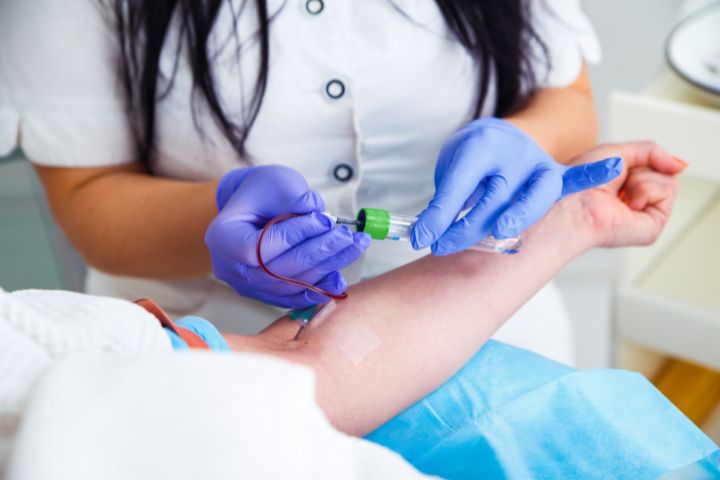The Path to Accreditation: Recognizing the Phlebotomy Training Course Journey and Its Relevance
As you consider the path to qualification in phlebotomy, it is necessary to comprehend the duty you'll play in healthcare. Your training will certainly cover vital abilities, from blood collection techniques to patient interaction. Each element of the program prepares you for the difficulties in advance. What exactly does the journey require, and why is qualification so critical for your future job? Allow's check out these concerns additionally.

The Role of Phlebotomists in Health Care
Phlebotomists play an essential duty in the health care system, working as the crucial web link between people and vital analysis testing. You'll execute blood draws, making certain samples are accumulated accurately and securely. Your knowledge aids in diagnosing clinical problems, keeping track of wellness, and directing therapy decisions.
In your everyday communications, you'll require to establish depend on with patients, making them feel comfy throughout what might be a difficult experience. You are accountable for classifying and dealing with examples meticulously to stop contamination or errors, which can affect test results.
Yet, you'll usually work together with medical professionals and registered nurses, communicating vital details concerning patients' conditions. Your function is essential in keeping the operations in healthcare settings, guaranteeing timely and precise outcomes. By understanding your abilities, you add meaningfully to individual treatment, making you an essential part of the medical team. Accepting this obligation is crucial to your success as a phlebotomist.
Review of Phlebotomy Training Programs
When exploring phlebotomy training programs, you'll locate numerous kinds created to fit various routines and discovering styles. Each program helps you create crucial abilities like blood collection and person communication. Recognizing these alternatives is vital to picking the ideal course for your occupation.
Kinds Of Training Programs
Numerous types of training programs are offered for those looking to come to be proficient in phlebotomy. Furthermore, some hospitals and centers use on-the-job training programs, providing useful experience while you find out. Whatever course you choose, each program aims to furnish you with the essential skills for a successful phlebotomy occupation.

Trick Abilities Created
Understanding phlebotomy needs a set of vital abilities that are developed through thorough training programs. In addition, communication abilities are essential; you'll need to engage with clients, explain treatments, and put them at ease. Each of these abilities is necessary for your success as a certified phlebotomist, making you a beneficial possession in any kind of health care setting.
Key Elements of a Phlebotomy Training Course
In a phlebotomy program, you'll concentrate on important subjects that prepared for your future job. You'll participate in hands-on training that enables you to use what you've found out in real-world settings. Both the curriculum and sensible experience are important for your success as a phlebotomist.
Curriculum Summary
While going after a phlebotomy training program, you'll experience a curriculum designed to furnish you with fundamental skills and expertise. Phlebotomy Courses Near Me. This curriculum normally includes anatomy and physiology, concentrating on the blood circulation system and recognizing blood components. You'll likewise learn more about different types of blood collection approaches, including venipuncture and capillary leak strategies
Additionally, infection control and security procedures are necessary components, ensuring you understand just how to keep a clean and sterile atmosphere. You'll examine patient communication, stressing communication and empathy, which are crucial for reducing patient stress and anxiety. Lastly, moral and legal factors to consider will certainly be resolved, preparing you for real-world duties. This foundational understanding will allow you to succeed as a phlebotomist and give top quality treatment in scientific settings.
Hands-On Training Experience
Getting hands-on experience is an important part of your phlebotomy training course. This sensible training enables you to use what you've found out in a real-world setting, improving your skills and confidence. Phlebotomy Courses Near Me.
Furthermore, you'll obtain the chance to connect with patients, which is necessary for establishing your interaction skills. This combination of technological proficiency and social skills is essential for your success as a licensed phlebotomist. Inevitably, hands-on training is where theory fulfills practice, strengthening your knowledge and preparedness for certification.
Accreditation and Licensing Needs
Before you can begin your profession in phlebotomy, it is essential to comprehend the accreditation and licensing requirements that vary by state. A lot of states require phlebotomists to hold an accreditation from an identified organization, such as the National Phlebotomy Organization or the American Culture for Scientific Pathology. These qualifications generally entail passing an exam that checks your expertise and skills in the area.
Along with certification, some states have particular licensing needs. You may need to finish a certain number of hours in scientific technique, submit proof of training, or go through a history check. It is very important to research your state's laws to ensure you meet all necessary requirements.
Remaining notified regarding these demands not only assists you protect a position but also enhances your reputation as a specialist. By meeting these needs, you'll be well on your means to a successful career in phlebotomy.
Hands-On Training and Practical Experience
Hands-on training and useful experience are vital elements of your phlebotomy education, as they enable you to apply academic expertise in real-world scenarios. Throughout your training, you'll involve in supervised venipuncture, discover proper techniques, and become acquainted with numerous blood collection tools. This direct involvement is critical for constructing your self-confidence and refining your skills.
You'll function carefully with experienced specialists who can direct you via the nuances of patient communication and sample handling. Each practice not only enhances your understanding however also prepares you for the hectic environment of medical care settings.
In addition, numerous programs include scientific turnings, enabling you to experience varied settings, from medical facilities to outpatient clinics. This exposure aids you adapt to various difficulties and person requirements, ensuring you're well-prepared for your future function. Embrace these possibilities, as they're necessary to becoming a competent and caring phlebotomist.
Challenges Dealt With Throughout Training
While acquiring hands-on experience is necessary, it is essential to acknowledge the obstacles that can arise during your phlebotomy training. You could encounter stress and anxiety when executing procedures on genuine people, especially visit this site if you're new to the atmosphere. The stress to obtain everything right can be frustrating. In addition, mastering the skills required for blood draws takes method; you might battle with method at first.
Time management can likewise be a difficulty, as balancing theory, useful sessions, and individual dedications can feel challenging. You might face varying learning paces amongst your peers, bring about sensations of insecurity if you believe you're falling back. check this site out Adapting to the different individualities of teachers can be difficult, as each may have an unique teaching design.
Acknowledging these challenges at an early stage can prepare you for success and help you create durability throughout your training journey.
Career Opportunities After Qualification

As you acquire experience, you might also consider concentrating on areas like pediatric or senior citizen phlebotomy, catering to details client demands. Some phlebotomists pick to advance their jobs by becoming research laboratory service technicians or going after further education and learning in healthcare fields.
In addition, your accreditation can bring about roles in training or overseeing new phlebotomists, permitting you to share your knowledge. With the health care sector constantly expanding, your abilities will always remain in demand, leading the means for a stable and satisfying profession. Accept the possibilities waiting for you!
Frequently Asked Questions
What Is the Common Period of a Phlebotomy Educating Program?
Phlebotomy training programs typically last around four to eight weeks. You'll take part in hands-on practice, classroom instruction, and online knowing. Completing this training prepares you for accreditation and a satisfying job in medical care.
Are Online Phlebotomy Courses Available?
Yes, on-line phlebotomy training courses are readily available. They supply adaptability and ease, permitting you to examine at your own speed. Simply validate the program is approved to fulfill qualification needs and get beneficial abilities for your occupation.
Exactly How Much Does Phlebotomy Training Normally Price?
Phlebotomy training commonly sets you back in between $700 and $2,500, depending upon the program and place. You need to think about elements like course size, included materials, and hands-on experience when choosing the appropriate training for my website you.
What Are Typical Prerequisites for Phlebotomy Training?
Typical prerequisites for phlebotomy training usually include a senior high school diploma or GED, immunizations, and a history check. Some programs may additionally require standard healthcare expertise or accreditations, guaranteeing you're gotten ready for hands-on training.
Can I Function While Completing My Phlebotomy Training?
Yes, you can function while completing your phlebotomy training. Lots of students equilibrium jobs with their researches, but make particular to manage your time efficiently to guarantee you satisfy both job and training commitments effectively.
Comments on “How a Phlebotomy Training Course Prepares You for a Successful Healthcare Career”